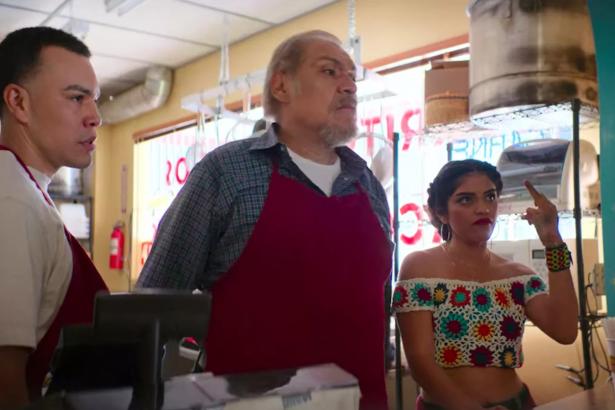tv Netflix’s Gentefied Follows a Mexican American Family in the Heart of a Gentrifying LA Neighborhood
In Gentefied, everyone knows the score. That’s the dark joke about being a young person of color in the US, where access to information is more equitable than the power to use that information. It’s easy to know exactly how you’re being shut out of opportunity and hard to do anything about it. For the Mexican family at the heart of Gentefied, the game is clearly rigged, and winning it might cost more than it’s worth.
Netflix’s new half-hour dramedy from producer America Ferrera and writer / creator duo Linda Yvette Chavez and Marvin Lemus follows a trio of cousins who struggle to keep their grandpa’s taco shop afloat in Los Angeles’ Boyle Heights neighborhood. This is harder than it’s ever been: gentrification is sweeping through the neighborhood, slowly forcing the Chicano population out of town at a time when money isn’t easy to come by.
Each cousin has their own dream in addition to the family one: Ana wants to be an artist and struggles to scrounge together expensive supplies and find a showcase for her work. Erik is torn between being responsible for running the shop and his desire to have a family of his own. Chris, just back from college, wants to be a chef in Paris, though it means stifling his Mexican heritage.
In following the three of them and those in their orbit, Gentefied is both a celebration of a modern Mexican American family and also the story about their struggle against the ever-present threat of erasure. At every juncture, there’s something that wants them to forget who they are. In his studies to be a chef, Chris has developed an affinity for the upper-class, culturally sterile world of fine dining. Ana’s desire to find a platform for her art puts her at odds with her activist friends. Erik’s pride and machismo jeopardize the profitability of the shop and his relationship with Lydia, his estranged, pregnant ex who he wants to prove he’s good enough for.
Lined up above them all are the invisible guillotines that dangle over many people of color in America. The ever-present call of the landlord; the racism of employers that must go unanswered, lest you lose your job; and the ambient threat of ICE officers who do not particularly care if you are a citizen.
The show does seem to sometimes rely on a checklist, the kind that comes into play whenever there is a story about the slow infringement of wealthy white people on communities of color. A lot of the same tropes are present, whether it’s a show like Gentefied or Vida or The Chi before it. There are millennials who want all the same Instagram-friendly food and decor for taco Tuesday, landlords who would rather rent to said millennials at top dollar than the already-high rates they charge their current tenants of color, and the upper-middle-class institutions that only really want people of color if they clean up their act. (Read: be more white.)
THIS IS THE EXISTENTIAL THREAT FACING THE CHILDREN OF IMMIGRANTS NOW
Stories about the children of immigrants often revolve around the fundamental tension of being caught between the culture of their parents’ homeland and that of the home where they were raised. These kinds of stories are as old as immigration itself. In Gentefied, there’s the modern wrinkle of “authenticity,” the monied interest in a culture sanitized for white consumption and social media clout without any concern for place, for people, for history. It is a constant pressure, easy to give in to and fun to participate in.
It’s also impermanent. Soon, there will be something else. The tastemakers will move to another neighborhood, and no one will care for the accommodations once made for them. This is the existential threat facing the children of immigrants now. Fighting it seems impossible, an extra set of obstacles in addition to the regular set of hurdles you have to clear in order to achieve the better life your parents want for you. Give in, and all that will be left is the exorbitant rent in a gutted neighborhood your family left long ago, leaving fragments of a culture you are already starting to forget.


Spread the word